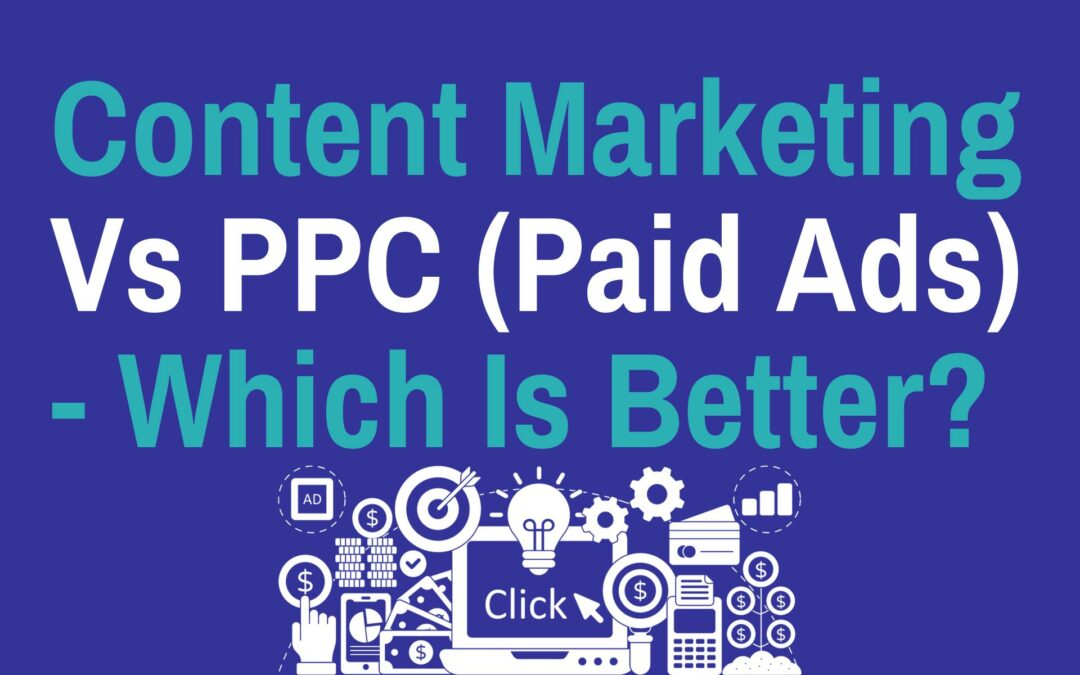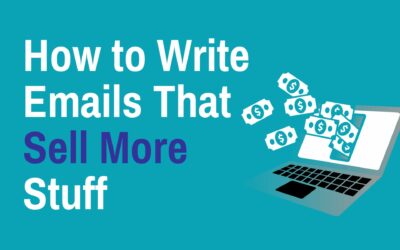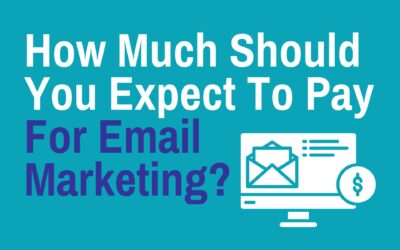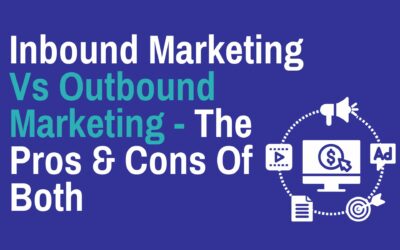Well… not quite.
This blog will give you an introduction to the similarities and differences between content marketing and PPC (pay-per-click) ads – and help you weigh up which one is better for your business.
What Is Content Marketing?
Let’s start with a quickfire definition of content marketing.
Content marketing is anything you produce on your channels with the intention of generating interest in your business. This can be (but isn’t limited to) emails, blogs, web pages, brochures, social media pages…the list goes on!
Chances are you’ve done some content marketing for your business without even realising it. Have you replied to a review left on your Google page? That’s content marketing. Home page of your site? Content marketing. Follow-up email when a lead first enquires? Social media or blog post?
You guessed it. Content marketing!

What Are PPC Ads?
PPC stands for pay-per-click. This means that you only pay for your advert when someone clicks on it. This is most prevalent in the form of Google Ads, as well as on social media platforms such as Facebook, Instagram, TikTok, YouTube and so on.
If content marketing is a slow release, then PPC is the quick-injection alternative.
The Pros Of Content Marketing
Let’s start with content marketing.
OK, so we’ve explained what content marketing is. Next question: why should you implement it in your business?
#1: Better Quality Leads
Content marketing speaks to your target audience directly. If you write something specifically for someone looking to buy your product or service, they will already have a more vested interest in engaging with you.
And you know what that means? Better conversion rates, which means more sales further down the funnel for you. Content marketing focuses on long-term quality rather than quantity. Get it right, and you could be converting leads left, right and centre.
#2: It’s Profitable For Longer
This is one thing you don’t get with PPC ads. When you post a social media ad, its engagement will reach a peak and then slowly start to decline into irrelevancy.
With content marketing, what you create is part of an ever-growing spider web. Say you write a blog that links well to another blog from a month ago? Boom. You’ve just got two of your blog posts read rather than one social media post.
Bear in mind that prospects will often visit 20+ pages of your website before they talk to your Sales team.
Crazy, right? So use these 20 pages wisely – whether you direct them onto an ongoing nurture email series to keep them interested in you or keep posting informative blogs that your customers will actually care about!
#3: It Converts More Clients
Content marketing converts more clients because it is a journey of baby steps.
When it comes to asking for your clients to action things, you need to make sure that you have given them something valuable first. Every action is a transaction, and this includes:
- Filling out a contact form
- Giving you a call
- Signing up to an email list
Asking someone who’s just found one of your pages to jump onto your mailing list is a big step – so content marketing is providing that transactional value by offering free knowledge to the prospect.
People who receive free stuff from you feel more obligated to buy! It’s called reciprocity and you can learn more about it here…

#4: It Educates Prospects And Builds Trust
We’ve said it before, and we’ll say it again. Consumer ignorance is not a good sales tactic.
And when it comes to building trust with your prospects, there is no better method than content marketing. Take blogs, for example; they’re the perfect way to educate the general public about the pros and cons of your product or service.
Hold on, I hear you ask, why would I tell people why they shouldn’t buy from me?
It’s simple – if you’re the only one in your industry being this transparent and honest, people will remember you. They’ll trust you. And as a result, they won’t feel manipulated into buying from you. It will be their own organic decision, having all of the information in front of them.
The Cons Of Content Marketing
(There’s a pun in there somewhere…)
What are the downsides of content marketing when pitted against PPC ads? Keep an eye out for these when seeking out a solution to your marketing problems…
#1: It Takes Time To Work
In our blog 4 Reasons Why Content Marketing Might Not Work For You, we covered the fact that results with content marketing are like a hockey stick curve. You’ll often get absolutely no engagement for a while, then it’ll suddenly take an upward curve that’ll keep on delivering.
But this isn’t great for every business. If you need results now, you can’t rely on content marketing to start working for you overnight. This is where you might want to consider another method of marketing.
#2: It’s Hard To Measure Returns
How do you know which particular blog post, email or web page made your prospects finally cave and get in touch with you?
Whilst PPC ads make it easy to track by their very nature, content marketing is much more difficult when it comes to measuring success. That doesn’t mean you can’t track it, you just need to know what you’re looking for and how to measure the data.
#3: You HAVE To Be Consistent
Whilst content marketing doesn’t rely as heavily on algorithms as paid ads, you do need to be posting consistently before the algorithms recognise you. And without this exposure, how can you attract your customers in? It’s a tricky one, especially if you’re a business owner who is just starting out.
#4: It Requires Expert Strategy
Content for content’s sake is a waste of your time, money and resources. You need to be prepared to put in the hours in order to come up with a working content strategy, which provides a slow but consistent pipeline from prospect to (hopefully!) repeat customer.
If you’re paying for someone to create content for you, such as a freelancer or content marketing agency, it is totally redundant unless every single piece of content plays a part in your overall funnel. You have been warned!
The Pros Of PPC Ads
So, how do Pay Per Click advertisements weigh up against content marketing? Paid ads certainly do have a number of edges over the latter when it comes to cost efficiency. For example…
#1: Speedy Return On Investment
When you create an engaging paid advert, it takes very little time at all to gain traction. You pay for an ad slot, and you wait for the number of users on your pages to go up.
Not only is it simple, it’s fast. This is excellent if you haven’t got the time to spend on a content marketing strategy.
#2: Easy To Track Your ROI
PPC allows you to see exactly where your leads are coming from – which ad they clicked, how long they spent on it, where they’re viewing it from, and so much more. When you know precisely which bit of your advert hit the mark, you know how to resonate with people. So it gets easier to find new prospects and convert leads every time.
#3: People Searching Will See Your Name
Let’s say you sell clothing.
You need to shift your stock. You haven’t got time to spend writing a blog about whether your prospects should buy this coat or that one. You need your stock gone so you can keep the cash flowing!
So when you put out paid ads, people who have a digital footprint that suggests they’d be interested will see your results when they search for anything clothing-related. And when it’s a product you’re selling, this can often be better for getting your name out there.
More exposure equals more sales, right?
The Cons Of PPC Ads
Alas, every quick fix has a catch. What are the annoying pitfalls of using PPC ads instead of content marketing?
#1: Price
As the name would suggest, pay-per-click advertising is an expensive strategy if you aren’t equipped for a sudden uptake in traffic. Not only will you need to pay for your ad spend; but you’ll also need to hire someone to keep track of all of your ads. For many businesses, this just isn’t doable.
You can do it yourself, but do this at your own risk! This takes us to number 2…
#2: You NEED An Expert (Or It Will Cost More)
There’s a thing on Google called ‘Stupidity Tax’.
What this means is that you can end up accidentally paying for ads to appear in totally irrelevant categories, in front of the wrong people or just simply incorrectly, meaning that people will never actually want to buy from you.
For example, if you were an accounting business running PPC ads, and you didn’t tell Google NOT to display you for search results about accounting and finance courses, you’d be haemorrhaging money from ads that nobody will click on – because that isn’t what you do!
Without hiring an expert to advise you on what to do (which comes at its own cost), the risk involved with PPC advertising can be an enormous loss for your business.
#3: Your Sales Funnel Must Be Watertight First
Be honest with yourself here. If you’re mindlessly scrolling through Facebook, your mind is not on spending large amounts of money. You’re most likely looking at pictures of your friend’s dinners, their children and their pets.
If you see an ad that piques your interest and click on it, what will your reaction be if the first thing you see is a giant popup saying: ‘BUY FROM ME! Give me your email address! I’ll give you 50% off your first order!’
You’d have whiplash!
And without a solid sales funnel on the back end, your business could be having the same effect on people who click on your ads. After all, you can’t speedrun trust!
#4: PPC Ads Only Display While You Pay
While content marketing stays on your pages attracting warm leads, your PPC ads will only stay up for as long as you keep paying. Consider this carefully when factoring paid advertising into your marketing budget – how long do you want to run the ad campaign for? You don’t want to run out of money just as your cold leads start to warm up to you, after all.
#5: PPC Is Ever-Changing
Algorithms are a bit of an enigma. This means that you could have your paid ads all set up and making an excellent return on your investment, when suddenly something shifts in Facebook, Google or YouTube’s algorithm. And poof. You are carried away with the winds of change, and you don’t even know anything’s changed until your stats start to flatline.
It’s infuriating, especially if you’ve invested time and money into running the perfect ad campaign.
Content Marketing Vs PPC – Which Is Better?
Both content marketing and PPC have their strengths and weaknesses. Content marketing is by far the most reliable strategy, because its focus is on human psychology and trust rather than just exposure on a platform. But PPC can be the quick injection that a lot of businesses need to get themselves off the ground.
But depending on your business, your budget and how many people are dedicated to marketing in your team, you could use a fusion of both. Ads to bolster your initial reach, then content marketing to build that trust with your warm leads and eventually, convert sales in a consistent manner. It doesn’t have to be either/or!
If you’re wanting more unbiased evaluations of different marketing strategies, why not check out our blog on inbound vs outbound marketing to see which one can help you the most?
FREE EBOOK
HOW TO WRITE EMAILS THAT GET OPENED
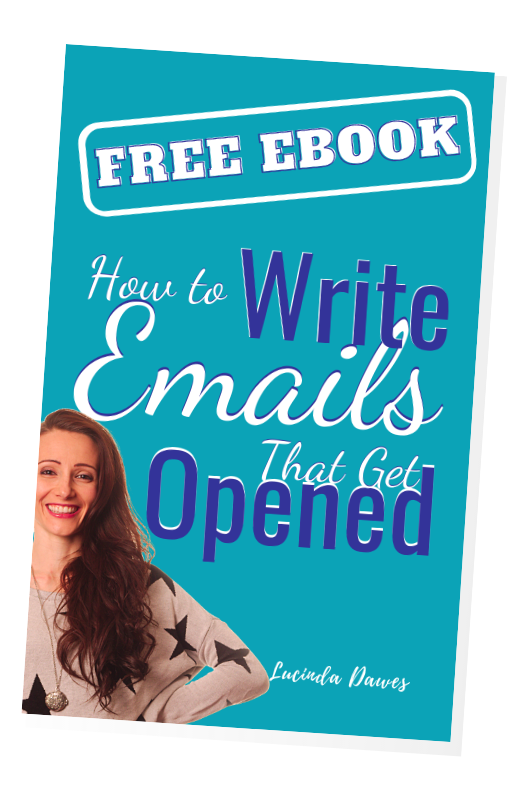
Read More Like This…
How to Write Emails That Sell More Stuff
What are you doing to sell your services or products? You have a shiny, modern website, right? It has an up-to-date shop with a great user experience? And you have regular blogs going up that are engaging and filled with SEO? That’s great. What about emails? I saw you...
How Much Should You Expect To Pay For Email Marketing?
Everyone likes a low-cost, high-return purchase. And that’s why marketing consultants are quick to sell you on the multitude of benefits of email marketing! It’s short, requires very little technical knowledge to get set up and can improve your customer retention like...
Inbound Marketing Vs Outbound Marketing – The Pros & Cons Of Both
Let’s be honest - the ‘Skip Ad’ button is one of the best things since sliced bread. Over time, marketers have learned that people don’t always like to be interrupted. Sometimes, you just want to watch your damn video! That’s how the ‘inbound marketing vs outbound...
